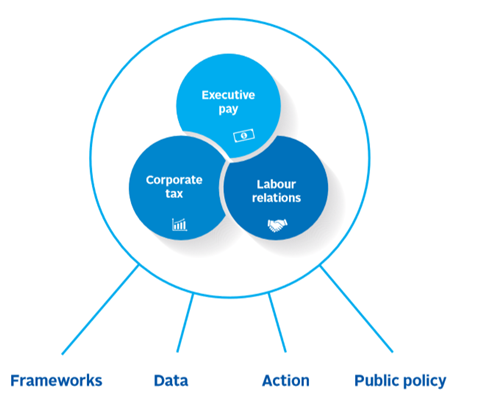Institutional investors are increasingly realising that income inequality – the gap in income and wealth between the very affluent and the rest of society – has become one of the most noteworthy socio-economic issues of our time.
It has the potential to negatively impact institutional investors’ portfolios as a whole; increase financial and social systemlevel instability, damage output and reduce economic growth, and contribute to the rise of populism, extremism, isolationism and protectionism.
The effects for investors of a massive income gap are potentially three-fold. It can:
- negatively impact long-term investment performance;
- change the risks and opportunities that affect the universe of investment opportunities;
- destabilise the financial and social systems within which investors operate.
All of these risks threaten portfolios and bottom lines, but what has been less clear is how institutional investors can manage these risks. Recognising this challenge, some investors are turning their attention to integrating considerations related to income inequality into their investment decision making.
Although the causes of income inequality are many and complex, this report addresses three themes material to long-term investors:
- employee relations and the structure of labour markets;
- corporate tax policies and practices;
- levels of CEO compensation.
In all three areas, which are key leverage points relevant to income inequality and material to long-term investors, frameworks that promote maximisation of short-term profits and returns can exacerbate income inequality. These frameworks also tend to minimise considerations of external costs to society and opportunity costs for support of basic social and environmental systems, infrastructures and stakeholders.
For each of these themes, this report explores the key aspects of the current structures that are exacerbating income inequality, and looks at how investors might encourage the emergence of new frameworks that are appropriate for the 21st century. The report also suggests paths that investors might take to adopt a more balanced view of how to create value, manage system-level risks and maximise rewards while still operating profitably and enjoying competitive returns.

Across the themes of labour relations, CEO compensation and tax, the approaches explored here emphasise how investors can:
- positively and effectively influence key current systemlevel frameworks; and
- address concerns material to their long-term financial interests and performance.
Based on a literature review and interviews with investors, the report focuses on four basic approaches that can help:
- ensure the availability of data that allows investors to make decisions to achieve competitive long-term returns while supporting frameworks that enhance connectivity within the system;
- identify how this data can be translated into actions by investors that will effectively influence these key frameworks;
- explain how these actions can address the risks to investors of the current frameworks and create rewards; and
- examine the implications for public policy.
Through the pursuit of these practical opportunities, investors can help change existing frameworks in ways that result in greater income equity such as through improved worker wages, benefits and training; more effective unions and wider union representation; less disparity between the very wealthy and others in society; and more impactful public policies aimed at promoting these goals. Such initiatives can improve social cohesion and trust in those societal institutions that ensure the stability of financial and economic systems, which is essential for long-term investments.
Among the specific suggestions that the report explores are the following:
Employee and labour relations
Data
Support data-gathering efforts, such as those by the Human Capital Management Coalition and the Workforce Disclosure Initiative, that emphasise basic facts on wages, benefits, training, retention and union relations.
Actions
Clarify expectations and engagement goals with corporations on their adherence to, and enforcement of, fair treatment of their direct and indirect workforce; support responsible contractor policies; publicly articulate positions on the risks of income inequality to economic growth, destabilisation of society and creation of reputational risks.
Frameworks
Contribute to a system that encourages a balance between appropriate cost controls and responsibility towards a firm’s direct and indirect workforce that can promote productivity, quality and company reputation, and also strengthen the stability of society.
Public policy
Support public policies that mandate disclosure of material labour relations data; set reasonable standards for minimum or living wages; and acknowledge union and human rights, among other things.
Corporate taxation
Data
Advocate the creation of a central source for comprehensive, standardised data on corporate taxation policies and practices in formats usable by investors.
Actions
Clarify expectation that corporations are responsible about paying taxes; engage to encourage corporate disclosure of policies and practices; endorse fair tax principles; promote integration of taxation issues into sustainability policies; publicly articulate how paying taxes contributes to the creation of social capital.
Frameworks
Contribute to a system in which the payment of taxes helps span the currently widening divide between the corporate/ financial communities and the government.
Public policy
Advocate for increased disclosure; support regulations that limit tax avoidance and prevent tax evasion; promote responsible taxation principles as a model for regulation; publicly articulate considerations for managing aggressive tax planning as a risk.
CEO compensation
Data
Support the analysis of existing CEO compensation data, including CEO-to-employee ratios.
Actions
Assess the implications of the linkage between CEO remuneration and the company’s stock price; develop alternative models that incorporate incentives tied to other stakeholders; support research on the implications of these alternative models.
Frameworks
Contribute to a system that appropriately rewards shareholders, while at the same time aligning with the interests of broader stakeholders and restoring the relationship between CEOs, employees and others, in ways that create long-term benefits to the corporation.
Public policy
Foster regulations that facilitate meaningful investor input into the design of CEO compensation packages; encourage mandated integrated reporting of corporations’ commitments to their full range of stakeholders as a means of ensuring CEO attention to these issues.
Downloads
Why and how investors can respond to income inequality
PDF, Size 2.05 mb











